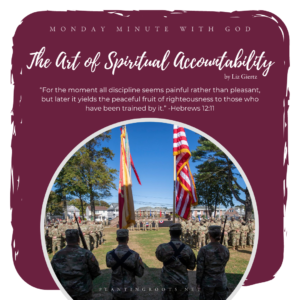In this week’s Monday Minute, Liz shares how the art of spiritual accountability enhances our readiness to stand firm in the face of Satan’s schemes. Don’t miss the downloadable tool at the end of the post to help you inspect your spiritual armor.

The Art of Spiritual Accountability
by Liz Giertz
When I was in the Army, we attended mandatory accountability formations.
Commanders scheduled them in the mornings Monday through Friday, sometimes at the end of the duty day, and always before a long weekend. These formations gave leaders the opportunity to ensure their subordinates were present for duty. But they also inspected uniforms, determined the serviceability of equipment, evaluated health, assessed frame of mind, assigned duties, and issued safety briefings.
This regular, face-to-face engagement enhanced unit readiness.
Let’s face it, it is basic human nature to pay attention to those things we know someone else will inspect. And to slack off on those things we think will slide under the radar or be swept under the rug.
Being late embarrassed me. I didn’t enjoy it when other Soldiers told me to tuck in my boot laces, straighten my cover, or that I was sporting some unauthorized uniform item. Discovering I didn’t know the newest changes to the unit schedule or pertinent regulations made me feel inferior. Being told my weapon or equipment was in unsatisfactory condition left me humbled. Leaders noticed when I felt ill by looking at my face. But often that same face revealed the thoughts in my head. (I still struggle with this.) Warnings about places and activities to avoid over a long weekend had a similar probability of precipitating changes to my plans and leaving me mortified that such things needed to be spoken. But I rarely made the same mistake twice.
Correction is rarely comfortable. (Hebrews 12:11)
Our human nature bristles at accountability. Nobody wants to be told what to do. But within the military community, we generally accept and respect the chain of command’s authority to do so. To think otherwise ushers in anarchy. As Soldiers, we learned to appreciate our shared responsibility to hold each other accountable so our unit would be as ready as possible when we faced the enemy. We generally viewed this form of accountability from peers and leaders as a system to uphold standards, not being judgmental. We could usually tell the difference between leaders who corrected us because they cared about our well-being and those who just wanted to harass or prove themselves superior.
The strongest units have members who hold one another accountable.
Within our personal lives, however, we generally expect and desire a little more freedom. We want to be able to do and say whatever we think is right. Too often, we base rightness on our feelings alone and then seek those who will agree with us instead of challenge us.
Yet as Christians we are to base our rightness on the Word of God. Many of the issues we see in society today stem from mankind’s collective failure to hold one another accountable to the Word of God. We lack an effective system of spiritual accountability. This happens at a variety of levels. Both personal and pastoral. As well as within our families, small groups, and greater communities.
Christ did not die to give us the freedom to follow our feelings, but rather his death freed us from the eternal consequence of our failure to follow Him.
As Christians, we cannot forget that we face an enemy who seeks to kill, steal, and destroy all we hold dear. Just as an inability to uphold military standards degrades our fighting power, our feelings and failures give Satan an advantage in battle. So why are we so resistant to being held accountable to those limitations and infractions?
The Holy Spirit works to convict, not condemn, us of our sin so that his power might transform us more and more into the image of Jesus. When we do things contrary to God’s definition of perfection we become weighed down and burdened by that sin, especially when we refuse to acknowledge sin as the source of our weakness or anxiety. But God’s Word also tells us we can repent and receive forgiveness for those sins.
Turning a blind eye to our fellow Christians who stray from the truth of God’s Word diminishes our collective witness. Like it or not, just as the failure of one military member casts a bad light on the military in general, one Christian’s blunder often reflects negatively on the whole Christian community and weakens our witness. A lack of spiritual accountability degrades our readiness for spiritual warfare.
A rejection of God’s rightful authority is spiritual anarchy.
Anarchy leads to a lack of accountability which leaves us individually and collectively vulnerable to Satan’s schemes. If we would not accept anarchy in our military formations, why would we allow it in our spiritual formations?
But there is an art to the application of spiritual accountability. Much like military tactics, conditions on the battlefield are fluid and require us to employ different strategies at different times. Satan’s tactics involve both enticing us to seek to fulfill our desires and then drowning us in condemnation for our failures. So we must prepare ourselves to meet each one head on.
Sometimes we need to remind ourselves that there is one true authority, to whom we will all answer. We must all accept God’s way is The Way. Failure to follow Jesus to live and love according to God’s law must be pointed out in a loving and gentle manner. But we must remind those whose sin already grieves them deeply of the freedom from condemnation we have. Jesus paid the price for our sins and gives us hope for eternal life in his kingdom because of his resurrection.
The art of spiritual accountability is knowing when to apply law and when to apply gospel.
It may sound tricky, but it is not optional for the Christian seeking to grow stronger and more mature in their faith. Holding one another accountable implies a high degree of personal accountability to knowing God’s Word for ourselves, an openness to correction, and dedication to God above all else.
Spiritual accountability is also relational.
Establishing relationships with other Christians based on mutual trust, respect, and genuine love opens avenues for accountability. I wouldn’t have publicly corrected a Soldier in another command, or much less a civilian, with whom I had no relationship for their failure to meet military standards any more than I would single out an erring Christian I don’t know personally. We can avoid accusations of being judgmental Christians when love inspires accountability.
A key piece of growing together is holding each other accountable to the Word of God. We have a duty to hold our fellow Christians accountable to God’s standards and remind one another of his grace so that we will be as ready as possible to stand firm in the fight against evil.
Our mission here on earth is far too vital to surrender to spiritual anarchy or apathy. Members committed to loving, spiritual accountability strengthen the Church.
We created this tool to guide you in holding yourself and others in your formation to high standards of spiritual accountability based on the Armor of God found in Ephesians 6:10-18. It includes questions to inspect the equipment God has given each of us to stand firm in the face of spiritual warfare and Scripture to help you correct any faults we may find.
Move Out
Read: Romans 14:12, Galatians 6:1-5
Reflect: In what ways are you currently rejecting God’s authority? How has your life been impacted by a lack of spiritual accountability?
Respond: Who in your life needs you to hold them accountable? If you don’t have a spiritual accountability partner, prayerfully consider seeking someone to fill that role in your life.
 Download your own printable Spiritual Accountability Checklist by clicking the image.
Download your own printable Spiritual Accountability Checklist by clicking the image.
Prayer
Dear Lord, forgives us for all the ways we reject your true authority and buck against accountability. Help us by your Holy Spirit to strengthen the Church by lovingly holding one another accountable to your law and gospel. Amen.





